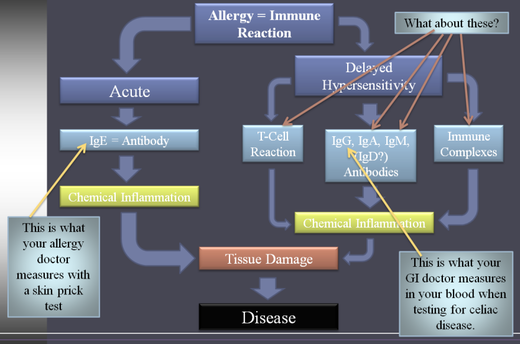What is Really Being Measured in the ELISA/EIA?
In addition to the lack of documented correlation between IgG and food allergy, it is uncertain if numerous companies doing this assay are even measuring what they think they are. Upon interviewing the companies that we send our patient samples to, we learned that all of these companies do their own "in-house ELISA/EIA." What that means is they designed their own EIA/ELISA tests from scratch. The questions that arise concerning "in-house" ELISAs is how and where the companies obtained the food antigens that coat the 96 well ELISA plates. In other words, what are the circulating antibodies in patient sera binding to? One of the labs that we evaluated claimed "proprietary information" as to the manufacture of their antigens but the other two labs both bought the food antigens for their ELISA panels from a company in Oklahoma. Interviewing the chief technologist from this Oklahoma company gave some surprising insights into their food antigen preparation. The foods to make the antigens were obtained from a local Oklahoma market (they "tried to buy organic foods whenever they could").
The foods were then chopped finely and diluted to make the antigens. Other than several rinses with an organic solvent (acetone), the food antigens were not purified. The problems that may be associated with this preparation are enormous. For one, all food (organic and non-organic) is coated with microorganisms. The most common of these include bacteria and fungi but viruses and parasites may also be found on fruits, vegetables, grains, milk and meat products. Microorganisms have many antigens that are highly immunogenic. It is common knowledge that most people have high circulating levels of IgG to a number of common microorganisms. To this likely wealth of microorganisms in the testing wells, there is the presence of possible pesticides and organic solvents that are not (according to the technologist interviewed) rinsed away during preparation.
Therefore, what is really being measured in these panels? Is it an immune reaction to certain foods or is it a person's exposure to common bacteria and fungi? What about a person's previous exposure to pesticides and organic solvents? Numerous studies have shown high levels of IgG to pesticides and organic solvents in persons with high exposure rates. It is possible that there are many antigens in each well, If that is true, then one would see a high number of non-specific antigen/antibody interactions, giving a high number of false positives in these tests. Are there a high amount of nonspecific binding and false positives occurring in these tests? There is no way to test this easily, at the present time. However, what was seen in our small study correlates with this hypothesis. The patient whose blood was drawn for our reproducibility studies is in very good health with no current signs and symptoms of food allergy. This person, however, tested reactive in 76% of Lab A's test (73 positive/96 foods), in 29% (28 positive/95 foods) of Lab B's test, and reactive in 22% (22 positive/102 foods) of Lab C's test.


 ], classically considered "superfoods" and tolerated by just about everybody!
], classically considered "superfoods" and tolerated by just about everybody!